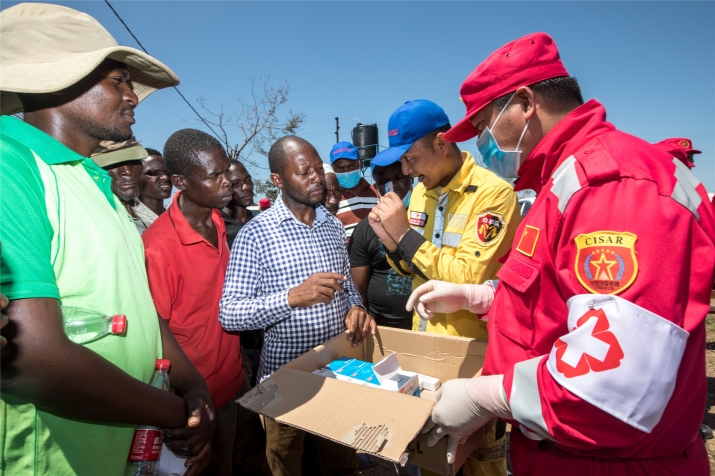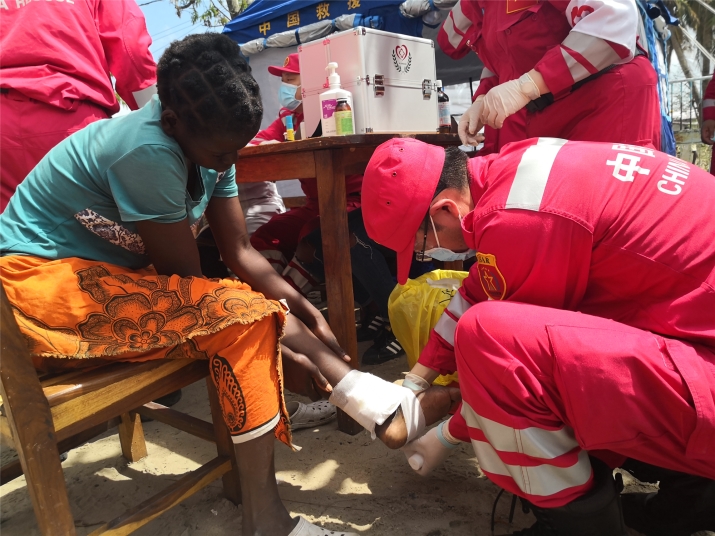|
||||||||||
| Home Nation World Business Opinion Lifestyle ChinAfrica Multimedia Columnists Documents Special Reports |
|
||||||||||
| Home Nation World Business Opinion Lifestyle ChinAfrica Multimedia Columnists Documents Special Reports |
| ChinAfrica |
| Planning to Rebuild |
| After cyclone Idai's destruction of Beira, it's time to look ahead at rebuilding the city |
| By Paulo Mendes | VOL.11 May ·2019-04-28 |

Chinese rescue team members distribute medicines to people in Mozambique affected by cyclone Idai (ZHANG YU)
The roots of the robust ancient trees that lined the streets of Beira, the second largest industrial city of Mozambique, could not withstand the 200 kph winds caused by cyclone Idai, which also ripped asphalt from the roads and the roofs off buildings, trapping people inside.
After the wind came the torrents of water, more than 2 meters high. Whatever had withstood the wind was swept aside by rushing waves pounding into the structures where survivors had taken refuge.
According to Mozambique's Institute for Disaster Management, the city was 90 percent destroyed by the cyclone, which made landfall on March 14, killing more than 600 people, destroying about 3,400 classrooms, 54 hospitals and more than 200,000 houses.
In less than 24 hours, one of the worst cyclones on record to strike Africa and the Southern Hemisphere had completely changed the face of Beira, leaving the whole world amazed by the magnitude of damage.
Beira's population is given as 556,000 in 2019 according to populationstat.com.
Beira reimagined
The mayor of Beira and Mozambican experts say there is a need to completely rethink Beira's layout and seek safer areas to place a large part of the people who lived in the city.
Daviz Simango, Mayor of Beira since 2003, believes that while very tragic, this catastrophe provides an opportunity to replan the city by paying attention to housing issues that was previously not possible. This is because of the complexity of the disorderly constructions and dwellings that were erected after the country's independence from Portugal in 1975.
"This cyclone reminds us that it is cyclical, we do not know when it will come back and how it will return, but we have to be prepared. This is the right time to rethink how we rebuild our city. Now we are registering [strong] winds twice as often as usual, [so] we have to build infrastructure adapted to these situations," said Simango.
According to Carlos Serra Jr., one of the most influential environmentalists in Mozambique, Beira is a coastal city most vulnerable to natural disasters because it was built on an ecologically sensitive area and there was no orientation of the population during the city's construction.
"If we had to choose a better location for the city, it certainly would not be the [current] one. We would have to look for a safer place that is not a low zone with flood-prone soil," said Serra.

Chinese doctors help a Mozambican wounded inthe cyclone Idai tragedy (NIE ZUGUO)
Green infrastructure
Much of the infrastructure in Beira, as with other parts of the country, including the capital Maputo, dates back to the Portuguese colonial time, meaning that it was already in a state of disrepair.
Serra sees a silver lining emerging from this catastrophe - an opportunity to rethink the relocation of the population to safer places and pursue more ecologically based infrastructure.
"What happened is that the population has been settling in ecologically sensitive areas and this has been impacting the local ecosystem. The activities of residents was destroying the mangroves and dunes [which are ironically] responsible for their very protection," he said.
Fernando Lima, commentator and analyst of public issues in Mozambique, also agrees that the effects of the cyclone can be an opportunity for the rehabilitation of the city of Beira, where he said there has practically been no investment in maintenance of infrastructure since national independence in 1975.
"This explains the level of [cyclone] destruction, [as] people lived in very miserable conditions in buildings [that were] too degraded," said Lima.
Local architect and university professor João Tique added that investing in land-use planning and sanitation systems should be a priority to improve the living conditions of the population. Another important aspect to consider is the quality of infrastructure planned for the future construction of the city, he said.
International support
The Mozambican Government, through the Post-Calamity Recovery Program, is organizing an International Donors Conference from May 23 to 30, to raise funds for the reconstruction of Beira.
The program is a government-initiated platform with the responsibility of seeking effective mechanisms to rebuild Beira. After having done a study, it concluded that it will take about $100 million to rebuild the city in five years, the funding of which will come from partner countries.
According to Mayor Simango, all the work on the green infrastructures and drainage systems in the city were previously made with foreign aid and therefore, he said, they will continue to rely on foreign aid, taking into account that Mozambique does not have the economic conditions to meet this need in less than five years. The same sentiments are shared by economist João Mosca, who believes that it is not possible for all the money necessary to rebuild Beira to come from the Mozambican Government, so there will be a need for international funding.
The city of Beira is mostly supported by the important Port of Beira which is a point of unloading, entry and exit of goods from neighboring countries that do not have access to the sea, such as Zimbabwe, Zambia and Malawi. The cyclone devastation has therefore also impacted the flow of goods destined to and from these countries.
Disease control
The World Health Organization (WHO) said on April 1 that $38 million will be allocated to contain and minimize the extent of cholera outbreak in central Mozambique in the next three months. The disease is the direct result of compromised water and sanitation infrastructures following the devastation of the cyclone. The announcement was made by Matshidiso Moeti, WHO's Regional Director for Africa, in the emergency operation center in Beira, who said the WHO has been coordinating the action of all the health partners in central Mozambique.
"With a good plan established and the good cooperation among the partners and the government, we will help Mozambique to minimize the impact on the health of the people and deaths from these various risks of this emergency," she said.
According to Xinhua News Agency, China's rescue team has donated disaster-relief equipment valued at some $700,000 on April 2, including rescue kits, hospital supplies, medications, folding beds and tents to health authorities in Beira.
Ussene Issa, National Director of Medical Assistance of the Mozambican Health Ministry, told Xinhua that China's aid will relieve the health sector's pressure in dealing with the current emergency.
"China has not only offered the donations we are receiving today, but has also been involved in the medical care for cyclone Idai victims, distributing food and water. What we gained from China is necessary support and important reinforcement," said Issa.
(Reporting from Mozambique)
(Comments to niyanshuo@chinafrica.cn)
| About Us | Contact Us | Advertise with Us | Subscribe |
| Copyright Beijing Review All rights reserved 京ICP备08005356号-5 京公网安备110102005860号 |